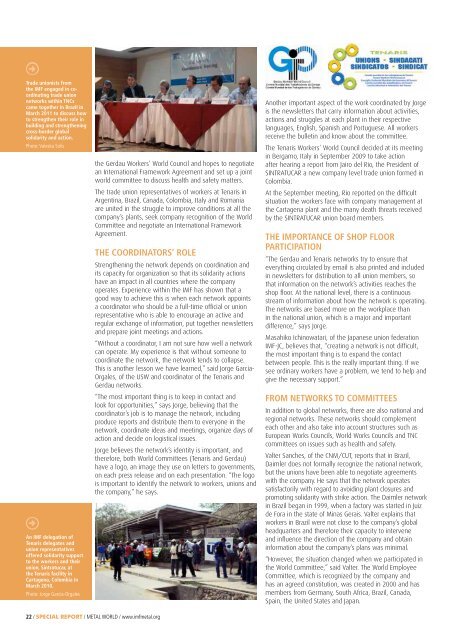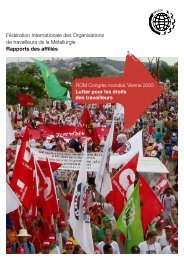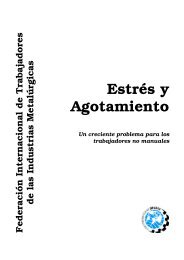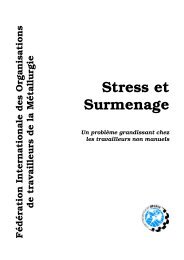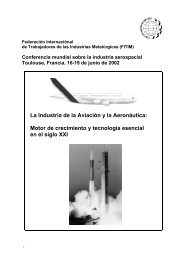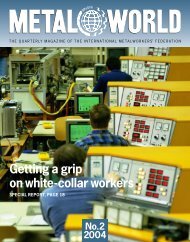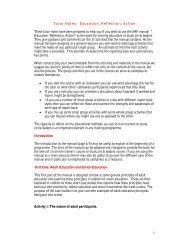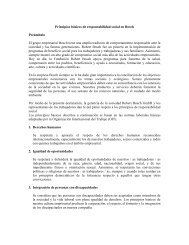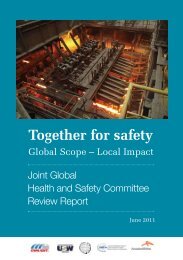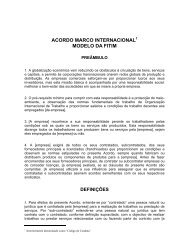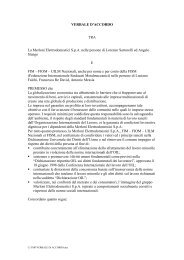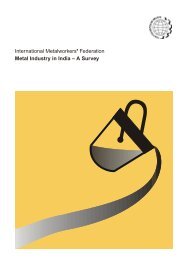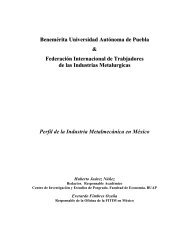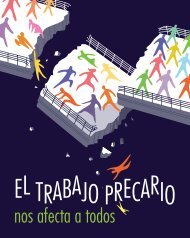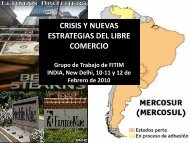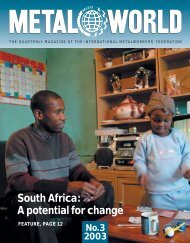Metal World 1 2011 - International Metalworkers' Federation
Metal World 1 2011 - International Metalworkers' Federation
Metal World 1 2011 - International Metalworkers' Federation
Create successful ePaper yourself
Turn your PDF publications into a flip-book with our unique Google optimized e-Paper software.
Trade unionists from<br />
the IMF engaged in coordinating<br />
trade union<br />
networks within TNCs<br />
came together in Brazil in<br />
March <strong>2011</strong> to discuss how<br />
to strengthen their role in<br />
building and strengthening<br />
cross-border global<br />
solidarity and action.<br />
Photo: Valeska Solis<br />
An IMF delegation of<br />
Tenaris delegates and<br />
union representatives<br />
offered solidarity support<br />
to the workers and their<br />
union, Sintratucar, at<br />
the Tenaris facility in<br />
Cartagena, Colombia in<br />
March 2010.<br />
Photo: Jorge Garcia-orgales<br />
the Gerdau Workers’ <strong>World</strong> Council and hopes to negotiate<br />
an <strong>International</strong> Framework Agreement and set up a joint<br />
world committee to discuss health and safety matters.<br />
The trade union representatives of workers at Tenaris in<br />
Argentina, Brazil, Canada, Colombia, Italy and Romania<br />
are united in the struggle to improve conditions at all the<br />
company’s plants, seek company recognition of the <strong>World</strong><br />
Committee and negotiate an <strong>International</strong> Framework<br />
Agreement.<br />
THE COORDINATORS’ ROLE<br />
Strengthening the network depends on coordination and<br />
its capacity for organization so that its solidarity actions<br />
have an impact in all countries where the company<br />
operates. Experience within the IMF has shown that a<br />
good way to achieve this is when each network appoints<br />
a coordinator who should be a full-time official or union<br />
representative who is able to encourage an active and<br />
regular exchange of information, put together newsletters<br />
and prepare joint meetings and actions.<br />
“Without a coordinator, I am not sure how well a network<br />
can operate. My experience is that without someone to<br />
coordinate the network, the network tends to collapse.<br />
This is another lesson we have learned,” said Jorge Garcia-<br />
Orgales, of the USW and coordinator of the Tenaris and<br />
Gerdau networks.<br />
“The most important thing is to keep in contact and<br />
look for opportunities,” says Jorge, believing that the<br />
coordinator’s job is to manage the network, including<br />
produce reports and distribute them to everyone in the<br />
network, coordinate ideas and meetings, organize days of<br />
action and decide on logistical issues.<br />
Jorge believes the network’s identity is important, and<br />
therefore, both <strong>World</strong> Committees (Tenaris and Gerdau)<br />
have a logo, an image they use on letters to governments,<br />
on each press release and on each presentation. “The logo<br />
is important to identify the network to workers, unions and<br />
the company,” he says.<br />
22 / specIal report / <strong>Metal</strong> <strong>World</strong> / www.imfmetal.org<br />
Another important aspect of the work coordinated by Jorge<br />
is the newsletters that carry information about activities,<br />
actions and struggles at each plant in their respective<br />
languages, English, Spanish and Portuguese. All workers<br />
receive the bulletin and know about the committee.<br />
The Tenaris Workers’ <strong>World</strong> Council decided at its meeting<br />
in Bergamo, Italy in September 2009 to take action<br />
after hearing a report from Jairo del Rio, the President of<br />
SINTRATUCAR a new company level trade union formed in<br />
Colombia.<br />
At the September meeting, Rio reported on the difficult<br />
situation the workers face with company management at<br />
the Cartagena plant and the many death threats received<br />
by the SINTRATUCAR union board members.<br />
THE IMPORTANCE OF SHOP FLOOR<br />
PARTICIPATION<br />
“The Gerdau and Tenaris networks try to ensure that<br />
everything circulated by email is also printed and included<br />
in newsletters for distribution to all union members, so<br />
that information on the network’s activities reaches the<br />
shop floor. At the national level, there is a continuous<br />
stream of information about how the network is operating.<br />
The networks are based more on the workplace than<br />
in the national union, which is a major and important<br />
difference,” says Jorge.<br />
Masahiko Ichinowatari, of the Japanese union federation<br />
IMF-JC, believes that, “creating a network is not difficult,<br />
the most important thing is to expand the contact<br />
between people. This is the really important thing. If we<br />
see ordinary workers have a problem, we tend to help and<br />
give the necessary support.”<br />
FROM NETWORKS TO COMMITTEES<br />
In addition to global networks, there are also national and<br />
regional networks. These networks should complement<br />
each other and also take into account structures such as<br />
European Works Councils, <strong>World</strong> Works Councils and TNC<br />
committees on issues such as health and safety.<br />
Valter Sanches, of the CNM/CUT, reports that in Brazil,<br />
Daimler does not formally recognize the national network,<br />
but the unions have been able to negotiate agreements<br />
with the company. He says that the network operates<br />
satisfactorily with regard to avoiding plant closures and<br />
promoting solidarity with strike action. The Daimler network<br />
in Brazil began in 1999, when a factory was started in Juiz<br />
de Fora in the state of Minas Gerais. Valter explains that<br />
workers in Brazil were not close to the company’s global<br />
headquarters and therefore their capacity to intervene<br />
and influence the direction of the company and obtain<br />
information about the company’s plans was minimal.<br />
“However, the situation changed when we participated in<br />
the <strong>World</strong> Committee,” said Valter. The <strong>World</strong> Employee<br />
Committee, which is recognized by the company and<br />
has an agreed constitution, was created in 2000 and has<br />
members from Germany, South Africa, Brazil, Canada,<br />
Spain, the United States and Japan.


